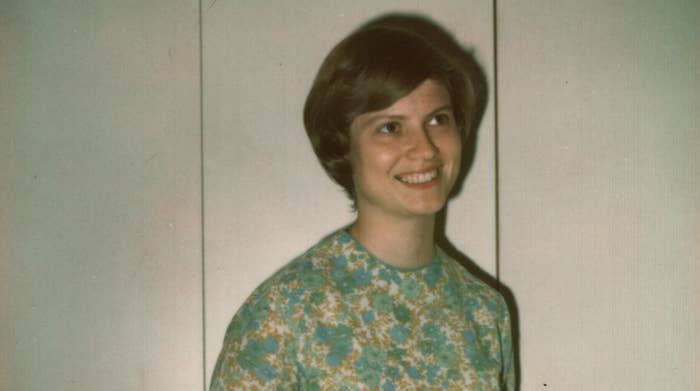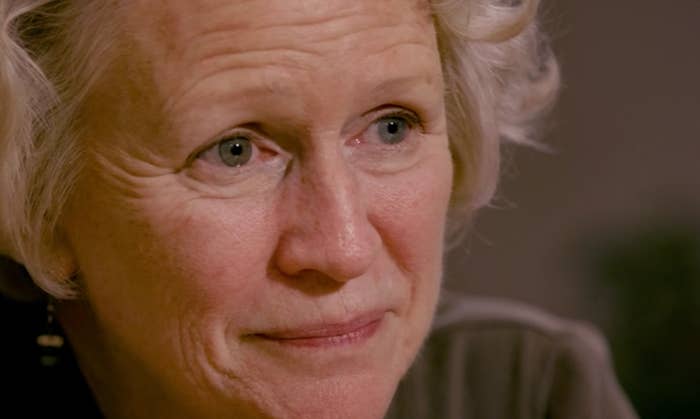
The Keepers is a complex documentary series about a group of senior women trying to solve a crime — the 1969 murder of Sister Catherine Cesnik, a teacher at a Catholic high school in Baltimore that many of the documentary subjects attended decades ago. The series and the women at its heart suggest that the murder was related to the alleged crimes of Father Joseph Maskell, a chaplain at Archbishop Keough High School who was accused of sexually abusing students there. Cesnik, who went by Sister Cathy, knew about the allegations of abuse, and she was going to report it, her former students say on camera. One of them, Jean Wehner, who brought a lawsuit against Maskell in the 1990s, says Maskell led her to Cesnik’s body before the nun’s remains were reported to police. Furthermore, some of the series' subjects say people affiliated with the church worked to suppress criminal prosecution of Maskell.
The Archdiocese of Baltimore has been railing against The Keepers online since its May 19 release, trying out hashtags like #TheKeepersUntold and #TheKeepersTruth in an attempt to discredit the documentary. At one point, its Twitter account retweeted a user who described the documentary as “fiction”; The Keepers’ director, Ryan White, took a screenshot of a tweet from the archdiocese’s account that said a recently completed test of Maskell’s DNA did not match DNA found with Cesnik’s remains. The church used emojis and the term “SPOILER ALERT.”
“You would have to ask them what that PR strategy is, but to me, it's sickening,” White told BuzzFeed News. The archdiocese’s dismissive tweets, he said, “led to me [being] on the phone with Maskell survivors in tears wondering why this institution continues to put them through the wringer in this type of way. Having spent three years with these survivors, who I believe ... it makes me angry.”
The church did not immediately respond to requests for comment on Friday, but Sean Caine, the director of communications at the archdiocese, spoke with BuzzFeed News Monday. “Obviously, as complex of a story as this is, it's not really ideal to play out on social media,” Caine said. The tweets, particularly the “fiction” tweet, suggested the church didn’t believe the abuse allegations. “In retrospect, it was a bad judgment,” he said. “That’s why we deleted it.”
On the day The Keepers launched, the church tweeted, “We don't dispute the abuse committed by Fr. Maskell, but The Keepers premise & conclusion are wrong,” with a picture of a pen checking off a checklist. White was mystified.
“I think if you ask anybody who's watched The Keepers, the premise is that girls were being abused and confided in Sister Cathy. The conclusion is that no one's ever been held accountable for the murder or the abuse,” he said. “I don't know what they mean when they say ‘the premise and the conclusion.’ They seem to be talking out of both sides of their mouth. ... What they're actually doing there is continuing to call certain survivors liars.”
In addition to Wehner, Charles Franz is another Maskell accuser who makes a claim disputed by the church; in the docuseries, he says that his mother told the archdiocese in 1967 that Maskell was abusing him. Franz’s account is directly contradicted by the archdiocese, which told White it had never heard any reports of abuse by Maskell until Wehner came forward as an adult in the 1990s. According to Caine, during settlement negotiations with the archdiocese last June, Franz said that he never told his mother about the abuse. The church was not asked directly about the comments Franz made in the documentary, Caine told BuzzFeed News. “We certainly would have responded to that,” he said.

In a Reddit AMA White did in late May, a user going by ArchBalt said it couldn’t release the internal files on Maskell that White asked for because the records contained personal information. The Reddit user, which Caine confirmed was a representative of the church, wrote that the records couldn’t be disclosed under archdiocesan policy and state law — among other things, the records contain confidential personal information.
It was the same answer White had gotten from the archdiocese before. “They've never responded to me when I said, 'Can you redact the information?'” he told BuzzFeed News. Caine responded: “Employers don't release employee information, regardless. That's just nothing that any reasonable person would expect to be done. We certainly wouldn't release it to a film production company.”
White added that he would like to see records of the investigation the church claims to have done in the 1990s when Wehner first came forward. “Why don't you at least release the records from your investigation in the '90s, and if you came up empty-handed with no victims' names, then there shouldn't be personal information to redact,” he said. “They didn't respond to that either. I would be very curious to see what that investigation involved in the '90s.”
Caine said, “The suggestion that the archdiocese didn't do everything it could to corroborate the initial allegation in '92 by Jean Wehner is really unfair. We invested hundreds of hours, we hired a private investigator, we interviewed former students, former faculty members, people in the community.”
As White shows in the documentary, when no one could initially “corroborate” Wehner’s story, Maskell was returned to a parish, and Wehner’s family conducted their own investigation through a letter-writing campaign. That investigation turned up dozens of fellow Maskell accusers.
Asked about this discrepancy, Caine said, “Most people looking at it objectively would say, 'How hard did you try if these people were able to do it on their own?' My answer would be, 'Thank god they did, thank god the people who came forward did come forward,' because it eventually led to Maskell's removal, and hopefully it saved a lot of other people from being potential future victims.” He said he believed victims likely found it was easier to respond to the post-office box Wehner’s family used for their investigation than it was to respond to a representative of the church.
On the archdiocese’s website, a list of “Frequently Asked Questions Based on ‘The Keepers’” claims they "offered on several occasions to answer any and all questions for the production." Caine said the church declined to participate on-camera because they felt they wouldn’t be given “a fair shake.”
“Even though we chose not to do an on-camera interview, I communicated with Ryan directly — we offered from day one to provide any responses to any questions that he had. And initially, they said, ‘No, if you can't go on camera, we're not gonna include you.’ And then at the very end of production, they sent us the list of six questions,” Caine said. (According to White, it was five questions.)
White laughed about the church’s circumscribed offer to participate. “Production, to me, says, this is a documentary. It's television. Everybody went on camera, including the abuse victims themselves. I'm not writing an essay, and they knew that,” he said. “It was disappointing, the amount of transparency and participation level that they did show.”
UPDATE
This article has been updated to include an interview with a representative of the Archdiocese of Baltimore Monday. The archdiocese did not immediately respond to BuzzFeed News’ inquiries on Friday.
